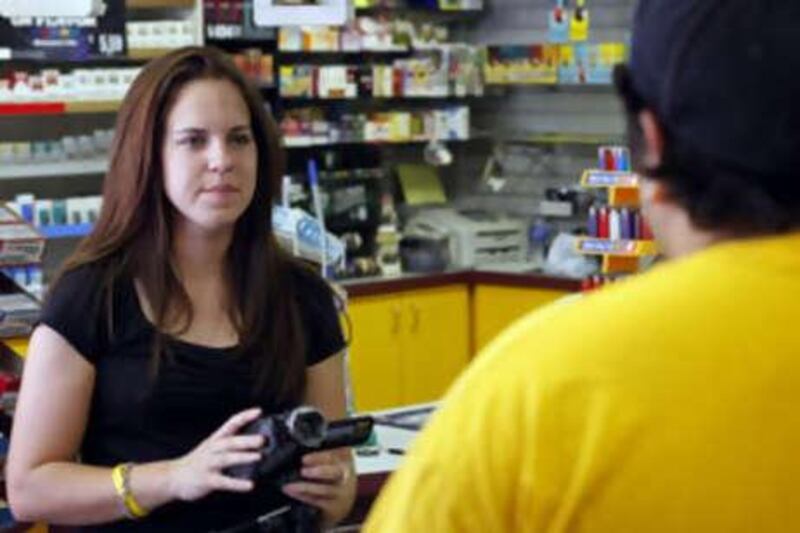WASHINGTON // Sara Pat Badgley hardly has the resume of a political correspondent. In fact, the 21-year-old college senior, who was too young to vote in the last presidential election, has no professional journalism experience at all.
But look for her at the Republican National Convention next month in St Paul, Minnesota, with a notebook, video equipment and full press credentials. She recently became an official "citizen journalist". While network television anchors and prize-winning reporters will soon converge at the Democratic and Republican conventions, so too will a crop of newcomers who - much to the chagrin of old-school journalists - are becoming a greater part of covering the news.
Ms Badgley, a University of Arizona student, was selected from about 150 contestants as one of two winners in the Decision08 Convention contest, sponsored by NBC News, its affiliated website msnbc.com and the social networking site MySpace. The other newly minted citizen journalist, covering the Democratic convention in Denver, is Matt Britten, a 23-year-old aspiring actor who lives in New York City.
Ordinary people suchas Ms Badgley and Mr Britten are finding a voice in US politics with greater frequency. CNN's new user-generated website, iReport.com, launched a film festival last month asking voters to document this year's presidential campaign and compete for a ticket to January's presidential inauguration. ABC News, which hosts a similar site called i-Caught, invites users to upload videos expressing their political views, some of which will be broadcast nationwide.
New websites called "aggregators", which collect user-generated photos, videos and blogs along with mainstream news, have become popular destinations for political junkies. Four of 10 newspapers say they host citizen-written blogs, according to a study published last month by the Pew Research Center's Project for Excellence in Journalism. But if everyone can do it, it also raises a question: is this really journalism?
Ms Badgley thinks so. "I think one of the things that citizen journalism brings is independence," said Ms Badgley, who hosts a conservative talk show on her college radio station and is not afraid to inject her opinion into her reporting. "You can look for your own personal story instead of generalising it for the public." But most professional journalists take a less positive view, research shows. Only one-third of national and local journalists had a favourable impression of citizens posting content on news organisations' websites, according to a Pew survey made public in March. Professionals also worry that the influx of amateur reporters with little or no training will blur the line between fact and opinion.
Like it or not, however, citizen journalism is on the rise. Bob Steele, who teaches journalism ethics at the Poynter Institute in Florida, said amateur news is one way to attract viewers as traditional news media flounder. "The business and economic models of newspapers and broadcast news has shattered," Mr Steele said. Media executives, he said, "are looking for content and looking for eyeballs, and one way to do that is to try to bring the public in".
Entrants to the MSNBC-MySpace convention contest created a short video answering the question: "How will you stand out in the crowd and get the scoop no one else can?" Ms Badgley and Mr Britten were declared winners after more than 50,000 MySpace users cast votes online. They will have hand-held video cameras and their blogs and video posts will appear on MySpace, msnbc.com and possibly national television.
But the contest has its share of critics - even in the citizen journalism community. Among them is Amanda Michel, director of OffTheBus, the citizen journalism section of the Huffington Post, a prominent online newspaper. "I don't think the criteria that they are asking for are necessarily the right criteria," she said. "This contest was just sort of thrown out there like ? anyone can be a journalist without really asking people to really show their work."
OffTheBus has about one million monthly visitors and professional editors training citizen "correspondents" in journalistic techniques and ethics, Ms Michel said. An OffTheBus writer was one of five finalists in the MSNBC competition. Their approach seems to be at odds with Mr Britten's, who said he plans to "unbutton the collar of journalism and have a little fun, asking the questions that may not meet traditional journalistic standards but that are on the minds of the citizens".
Whatever the approach, industry analysts said mainstream media's exclusive control of the public domain is long gone. "The genie will never go back in the bottle," said Al Tompkins, a national award-winning journalist at Poynter based in St. Petersburg. Still, it is unclear how those who are not paid to be full-time journalists will exist in a world where many people still are. Tom Rosenstiel, director of the Pew Research Center's Project for Excellence in Journalism, said citizen journalists will serve as complements to professionals, not replacements.
"It's adding spice to the meal, but it's not the entree," Mr Rosenstiel said. "If you took all the citizen media - all the blogs, all the alternative sites - their total audience is tiny ? compared to the six million people who watch the worst-rated nightly newscast". Even Ms Badgley hopes to be more than just a citizen performing an act of journalism. "I eventually would like to do the whole correspondent thing where you're on the [campaign] trail or out wherever the news is happening," she said. "I think that would be really cool." @Email:sstanek@thenational.ae






